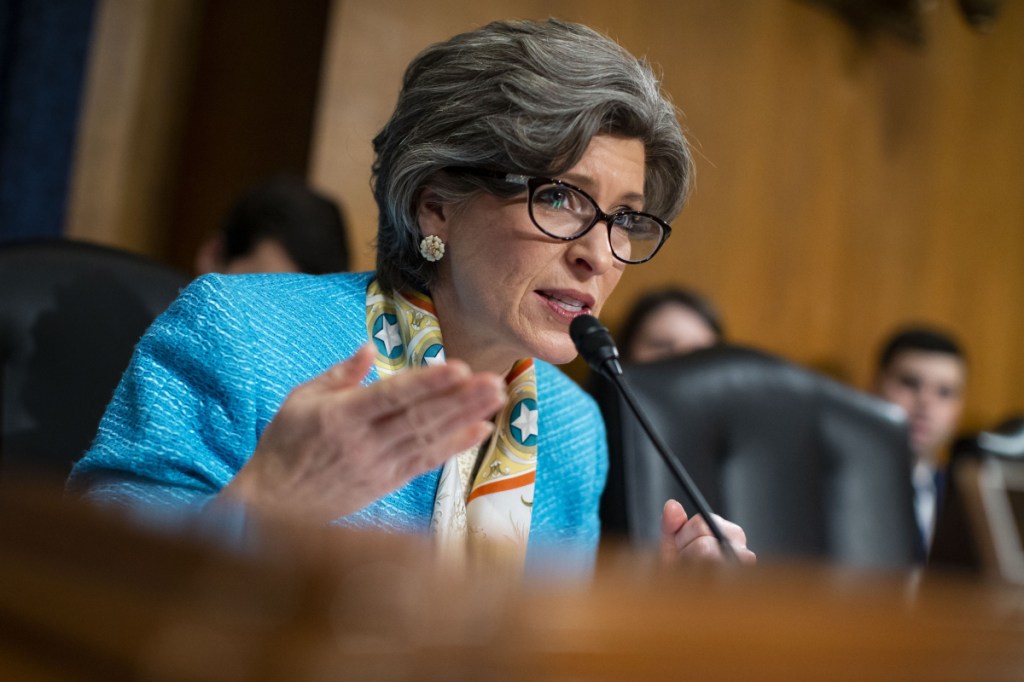In a moving and emotional interview, Sen. Joni Ernst, R-Iowa, said that she had been raped while in college, making her one of the highest-profile women in Congress to share an experience with sexual assault.
Ernst said she had entered into a relationship with someone who was “physically and sexually abusive” and alleges that he raped her at his home when she attended Iowa State University. She told Bloomberg that she called the campus sexual assault hotline and ended the relationship but did not report the incident to police. She did not reveal her alleged attacker’s name to Bloomberg.
“I was embarrassed,” she said of her decision not to tell. “I didn’t know how to explain it. I was so humiliated. And I’m a private person, when it comes to those things.”
Only 1 in 4 sexual assaults are reported to the police, according to the Rape, Abuse, and Incest National Network. And among women of college age, RAINN says just 20 percent of female students report it to the police.
The senator, who was elected in 2014 after running on a staunchly conservative platform, adds a Republican voice to the national conversation about sexual assault, also known as #MeToo.
“I didn’t want to share it with anybody, and in the era of hashtag-MeToo survivors, I always believed that every person is different and they will confront their demons when they’re ready. And I was not ready,” Ernst said.
But this week, court documents from her divorce became public, alleging physical and emotional abuse by her ex-husband, Gail Ernst, putting her private life in the spotlight. The documents were quickly sealed after initially being made public.
While the documents’ revelation that she had turned down a chance at being Donald Trump’s running mate made headlines, they also paint a portrait of a long-troubled marriage. They had married in 1992.
“He hated any successes I had and would belittle me and get angry any time I achieved a goal,” Ernst, who is vice chairman of the Senate Republican conference and the only woman in Senate Republican leadership, said in an affidavit obtained by the Guardian.
Gail Ernst, writing in his own affidavit, insisted, “I gave up all my aspirations and goals to be a good dad and husband so Joni could pursue her dreams.”
“He began hanging out at the babysitter’s house, even when (their daughter) wasn’t there,” Ernst wrote in the affidavit, as reported by CityView. “I confronted him about the situation, and we went through a very dark and troubling time in our marriage. I very nearly filed for divorce after a night that we argued, and it became physical. I fled the house (with their daughter) and went to my mother’s house in the middle of the night.”
She alleged other affairs, while Gail Ernst claimed that she’d “dated other men while in D.C.,” something the senator denies.
“What I want people to understand is that I was the same person I was last week,” Ernst told the Des Moines Register after her divorce papers were made public. She continued, “You just know more about what’s inside of me now.”
Congress itself has dealt with sexual misconduct allegations and investigations since the #MeToo movement began in 2017. Several male legislators resigned as a result of accusations.
In late 2017, two high-profile controversies hit the Senate, and Ernst spoke out about both. After The Washington Post revealed that Alabama Senate candidate Roy Moore had allegedly dated underage girls, per her staff, Ernst said, “if the allegations are true, he needs to step aside.”
“There is no place for sexual assault or harassment in our society,” Ernst said in 2017, when former Sen. Al Franken, D-Minn., was accused of misconduct by multiple women. He later resigned because of pressure from within his party.
At the same time, Ernst has been a staunch supporter of President Trump, who has been accused of sexual misconduct by several women.
She also voted to confirm Supreme Court Justice Brett Kavanaugh after he had been accused of sexual assault by Christine Blasey Ford.
Send questions/comments to the editors.



Comments are no longer available on this story